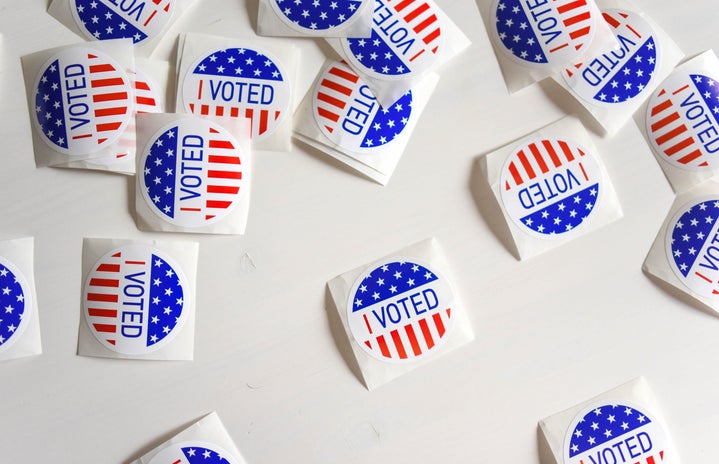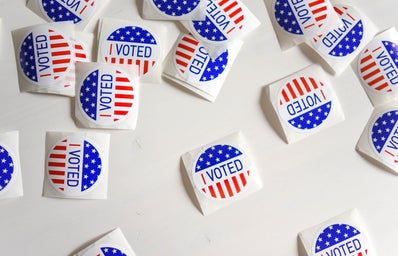It’s that time of the year again — the election is creeping up on us and it seems that voting should be on everybody’s minds. In his midterm speech to students at the University of Illinois at Champaign-Urbana, Barack Obama stressed the importance of voting “[…] [I]n the end, the threat to our democracy doesn’t just come from Donald Trump or the current batch of Republicans in Congress or the Koch brothers and their lobbyists, or too much compromise from Democrats, or Russian hacking,” he said. “The biggest threat to our democracy is indifference.”
However, U.S. elections continue to boast a very low turnout — in the 2016 presidential election only 56% of the voting-age population voted, according to a Pew Research Center study and a mere 43% of 18 to 24 year olds turned out to vote. While Pew Research Center says that this is an increase from participation in past elections, it seems that a higher turnout should be (and is) possible.
So when your friends tell you that they won’t be voting, here is how you can respond to those lame excuses (without, like, screaming).
“My vote won’t make a difference.”
This is the easiest excuse to make when it comes to voting and, let’s be honest, it’s not hard to think that your vote won’t have an impact when it feels like there are a million other people voting. However, many argue that a higher voter turnout would actually create a very different political landscape to the one we have today. In fact, according to a 2017 article in The New York Times, Republican-leaning demographics had a higher turnout than Democratic-leaning ones and this is also why we have a Republican-run government.
“Last year, Americans between the ages of 18 and 24 voted for Clinton over Trump in a landslide. Only 43% of citizens in that age group voted, however,” the article reads. “By contrast, Americans over age 65 supported Trump — and 71% of them voted. Similarly, Americans in their 30s were more likely to support Clinton, and less likely to vote, than those in their 50s.”
So whether you find yourself leaning more to the left or right, know that casting your vote could actually make a difference and shape the nature of our country as we know it. Already Pew Research Center says that voter turnout in Democratic House primaries has been up from 84% in 2014, while Republican turnout has been up by 24%.
“I’m not politically engaged enough to vote.”
Perhaps you get sick of seeing headline after headline of Bad Things™ happening in the world or maybe it seems like some issues are so loaded with background knowledge that you really couldn’t find yourself getting into it all. While I can’t convince you to become a super politically engaged citizen or that these issues may actually be worth reading about, none of this should actually stop you from voting. In fact, there are a number of ways to inform yourself without having to spend hours sifting through news reports.
Most candidates, whether presidential candidates, Congressmen or local Representatives, have some form of website and/or social media account where you can either read about their main political leanings or just get an idea from their tweets about where they stand (we know someone who does that particularly well). And when it comes to harder issues like trade agreements or the U.S. relationships with foreign countries, there a bunch of resources out there that can help you get an overview.
YouTube channels like CrashCourse of In A Nutshell give quick explanations on a range of different issues while news networks like CNN often have channels with short news clips or explanations about current affairs. Lifehacker also put together a great list of resources to tune into if you want to be more politically informed, such as FactCheck.org, a project run by The Annenberg Public Policy Center that gives the facts behind certain political positions or statements.
“I don’t like the candidates, so why should I bother?”
The truth is that one of these candidates will become President/Senator/Congressman/you name it and will be making decisions on issues that affect you. Maybe both of them seem bad and that really is unfortunate but throwing your vote away really isn’t the way to go. Perhaps you don’t feel like either candidate will do much of what you want but there must be something that they WOULD do that you would find horrible, right? So don’t vote for them. Ultimately, you’re in control of what is happening with your country.
Maybe you don’t like either candidates but a lot of people felt that way at the last presidential elections and look where we are now. According to Pew Research Center, a quarter of registered voters did not turn out because they didn’t like “the candidates or campaign issues.” However, how many of those people are actually happy with the state of government now? If you want to have the possibility (even if it seems slim) to influence the country to represent the way you think or think it should go, then voting is your ultimate way to influence that.
“The decisions made in Congress won’t affect me anyway.”
Although it may seem like Congress is as far away from your day-to-day life as it could be, they can have a huge influence on the way things develop for you. As Common Cause argues, “[t]here is not a single aspect of daily life that isn’t affected by Congress and often more directly by state and local government.”
Whether this is education, infrastructure or food you eat, ultimately, most things can be traced back to a decision made in Congress and those decisions will affect you.
“I’m just too busy.”
You say you’re too busy — but how long did you spend watching Netflix/YouTube/listening to a Podcast? In a 2014 report, Vox states that it takes about 20 minutes to stand in line and cast your vote on average. Guys, this is probably less than one episode of your favorite Netflix show.
While there is absolutely a problem with disenfranchised voters having issues, there are still efforts to make it even easier to register to vote — and then get out to vote. In 2013 Colorado passed its Voter Access and Modernized Elections Act, which seeks to make partaking in your civic duty easier, for example, by sending you a ballot in the mail. California is even easier, they don’t even ask for your ID! And there are cool apps to help to make the process as quick as possible. TurboVote, anyone?
Now it is almost as easy as a trip to the grocery store or actually your daily trip to Starbucks (those may even take longer than it does to cast your ballots).
In short, it’s easy to find an excuse not to vote, but even easier to find a reason why you should. Having the opportunity to vote is a privilege, which not all people have. Even if it doesn’t seem like who you’re voting in this election (or any smaller election) will affect your life that much, it very well could in the future.
Also registering to vote really feels like an accomplishment (at least, that’s what I can say from personal experience). So there you go. Happy Voting, friends!


